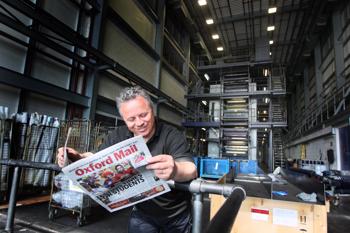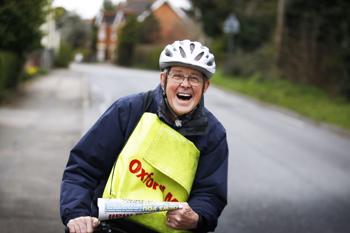
As one of Newsquest’s leading daily regional newspapers, the Oxford Mail is part of the publisher’s new “We’re there with you – please be there with us” scheme offering free home delivery during lockdown and introducing a £1 a week digital subscription.
Samantha Harman, editor of the Oxford Mail and its family of titles including the weekly Oxford Times, the Witney Gazette and the Bicester Advertiser, explains that while her team are busier than they have ever been covering coronavirus, the papers are also under a great deal of financial pressure, which is why they have reached out to their readers in this way.
In response to a decline in advertising revenue, Newsquest has introduced the new digital subscription on twenty of its larger websites in return for access to an ‘advertising light’ site with 80% of adverts removed as well as a 70% faster loading time. Online readers can still access twenty articles before they have to register and then a further twenty free articles before they reach the paywall and coronavirus stories and breaking news remain free.

“We have had some people complaining, but we go back to them and say trusted journalism costs money to produce. We’re just asking people who use our services a lot if they might consider contributing to the cost of it,” says Harman.
She adds: “Largely we’ve had a lot of positive feedback from people, who’ve signed up. I’m hoping that’s something that will come out of this crisis at the end of it, that people will recognise and appreciate what trusted local news is.”
Circulation is also down, and the Oxford Mail has had to look for ways to make sure regular print readers who might not be able to leave their home still get their copy, which is why from April 21 they have offered home delivery free of charge for six weeks.
Harman says: “We are trying to highlight paper boys and paper girls. We’re running stories on them. At first, we got a bit of kickback from people saying ‘You shouldn’t be allowed to deliver newspapers’, but the World Health Organisation has come out and said that the risk of getting coronavirus from goods is very low and it is safe still to receive a newspaper. A lot of our print readers are elderly, and we’ve had feedback from them saying the Oxford Mail is the only way that they can keep connected with their community.”

We’re making this decision now so that in the future we have a sustainable business.
Cost cutting
At the same time, some staff have had to be furloughed and those earning over £18,000 have had a 15% pay cut to whatever they earn over that amount. Harman says the important thing is to communicate the reason for the pay cut.
“If you just tell people you’re going to have a 15% pay cut without any context then they’re going to be saying ‘that’s not really fair’, but if you explain the context to your team, if you say, look, here are our circulation figures, here is our advertising revenue, we’re making this decision now so that in the future we have a sustainable business and we all still have our jobs, they are a bit more invested in the reasons why we have to make that decision.”
In her immediate team, only the sports reporter has had to be furloughed as there were already vacancies, leaving Harman, two news editors, six staff reporters and a BBC local democracy reporter to cover the busy county. The courts are still open, but council meetings have gone online, and her reporters are all working remotely. She says: “In my team we’re all really good at communicating, we have a WhatsApp group, we have regular [Microsoft] Teams calls just to check in with everybody. The reporters are quite fun because on a Friday night they’ve been going to a virtual pub at six o’clock.”

I think people are getting a bit of coronavirus fatigue.
Light relief
The Newsquest regional titles share a central hub which provides the non-news sections of the paper. Harman says these have become more important than ever since lockdown began, offering readers some light relief. Individual titles have the ability to feed ideas back into the hub, for example one of her team came up with the idea of publishing a ‘Clap for Carers’ poster for readers to display in their windows every Thursday, which has been shared across the group. She is also planning a big commemorative edition to mark the 75th anniversary of VE Day on 8 May. She says: “I think people are getting a bit of coronavirus fatigue. From my own perspective, working in it constantly in the news, it can be quite overwhelming, so I think people are looking for a bit of light relief. We have puzzles in the paper every day, but they’ve been expanded. The shared team are quite open. If you have an idea for something you want, they will sort it out for you, which is great.”
For the last nineteen years, the Oxford Mail has supported the Ox5 Run through the grounds of Blenheim Palace in aid of the Oxford Children’s Hospital Charity. While the run will not take place this year, the newspaper is urging readers to run or walk five miles at home to raise money for the charity. It is also running a ‘Still Open in Oxfordshire’ campaign to support independent local businesses who remain open or have diversified. “If they are a pub, for example, they might be doing takeaways and deliveries. We’re working with quite a few of them to add the Oxford Mail and some of our other brands to their deliveries,” Harman says.
I don’t think you could do this job if you didn’t really love it.
A vital job
Before taking the reins at the Oxford Mail in 2018, Harman started out as a trainee reporter on the Dorset Echo and worked her way up to group editor of Newsquest’s Berkshire and Buckinghamshire titles. She says: “I don’t think you could do this job if you didn’t really love it. We’re all working harder than ever before, but at the same time, these are the reasons I became a journalist and I’m sure that’s why anyone in my team became a journalist, these are the times when we are really needed, and we are doing a really important job.”
Her reporters are regularly on the receiving end of abuse, but she hopes that the current crisis will give people a greater appreciation of the work that local newspaper journalists do.
“Hopefully, this will give people a bit more of an education as to what we actually do and why it’s worth investing in. I hope that will be the long-term legacy of this. And that people will be a bit nicer to reporters as well, because they are not only human, but they also live in the communities and really care about their communities to do this job in the first place.”













